They haven’t seen Blitz…they’re just coasting along, playing it by ear…a wing and a prayer.

They haven’t seen Blitz…they’re just coasting along, playing it by ear…a wing and a prayer.

…is reportedly causing episodes of cardiac arrest among your 1.85 fascists. For Akira Kurosawa’s 1954 classic was out and about for roughly a full year after the April 1953 mandate for 1.85 theatrical framing had been instituted in the U.S.
Japanese exhibition standards may have been different 70 years ago, granted, but Kurosawa was no dummy — he knew his technical shit as well as Stanley Kubrick or any other top-of-the-line maestro — and therefore understood that The Seven Samurai would most
likely be projected stateside within a 1.85 a.r.
The sole criteria for 1.85 fascism, remember, is that it doesn’t matter if a given film was shot with an open aperture or with an ethos on the part of a d.p. that “more height is always right” (a longtime HE motto), but what the prevailing exhibition standards were when the film was released.
Hence the fascist shrieking being heard right now in certain quarters.


Remember that scene in Broadcast News (‘86) when Albert Brooks insisted to Holly Hunter that William Hurt’s smooth, amiable and ethically flexible news anchor was, in a certain sense, the devil?
I have long felt that the very likable and easy-going Ryan Reynolds represents, no offense, the same kind of satanic energy and influence.
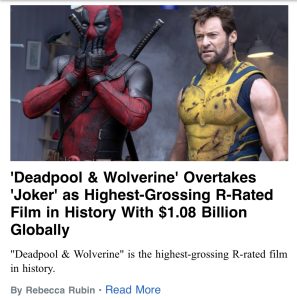
The same corrupt-insider, look-the-other-way mentality that allowed Matthew Perry’s ketamine addiction to be fed and indulged is roughly similar to the friends-of-Joe Biden mentality that resulted in months and months of straight-faced denial and lying when questions about his obvious cognitive decline were raised time and again
For the fourth or fifth time, witness Oskar Werner‘s brilliantly phrased summation of his case against suspected double agent Peter Van Eyck in The Spy Who Came In From The Cold.
Werner is one of the finest actors who ever lived, but his heyday only lasted for six years or so, from Jules and Jim (’62) to The Shoes of the Fisherman (’68). He was an alcoholic, and he died too young of a heart attack.

11:50 pm: I’m watching the cleaned-up 4K Bluray of James Cameron‘s Aliens (‘86), and it’s truly wonderful. Every frame is immaculate. Heaven.
Beware of minor, dismissible spoilers…the kind that only lily-livered, falsetto-voiced spoiler whiners will arch their backs over:
Earlier this evening, however, I sat through Fede Alvarez‘s Alien: Romulus, a handsomely designed, densely and confusingly plotted, under-lighted greatest-hits retread (“Get away from her, you bitch!”), and it made me feel more bored and frustrated and furious than I could possibly convey.
It was good to see the old, primitive, 1979-era computer fonts; ditto the return of Ian Holm’s Ash, but he overstays his welcome. Oh, and I really hated the spider-like human xenomorph mutant…I wanted to throw something gooey at the screen.
Wait…there is intact wreckage from the Alien-era USCSS Nostromo, which was totally blown to smithereens, and “remains” of the original Xenomorph are being researched? He/she/it was ejected into the external nothingness of space by Ripley.
The ensemble cast is way too young (“Where are the adults?”, I was muttering early on). I was able to discern roughly a third of the dialogue, if that, which forced me to pull out the phone and read the Wiki plot synopsis as I went along. The busy-bee script (penned by Alvarez and Rodo Sayaguez) drove me crazy, and the general overkill approach drained my soul. Alvarez is a house-music DJ.
I knew right away, of course, that each and every cast member except Cailee Spaeny would be dead before the finale, so there was that small comfort at least. Except Spaeny, a first-rate actress, is way too small of stature (what is she, 48 inches tall?) to take Sigourney Weaver‘s place.
Cameron’s 38-year-old film is somewhere between 15 and 20 times better than what Alvarez has wrought.
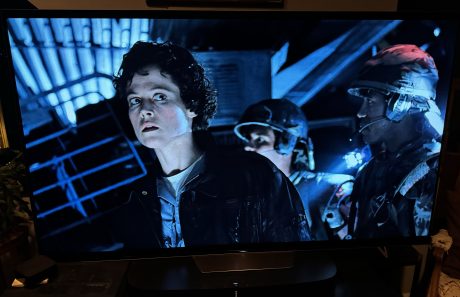

Blake Lively‘s Lily Bloom has two Boston-based boyfriends in It Ends With Us — neurosurgeon Ryle Kincaid (played by pic’s director Justin Baldoni) and Atlas Corrigan, whom she fell for in her teens and who is currently the owner of a restaurant.
The teenaged version is played by 26 year-old Alex Neustaedter (top); the Boston restaurateur version is played by 34 year-old Brandon Sklenar (bottom).
Does anyone see the slightest resemblance between these guys? Same character, different planets.
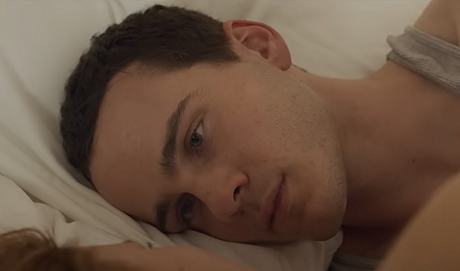
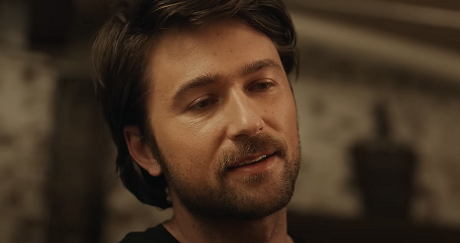
…and I’m ready to hate, hate, hate. Unless it’s good on the level of the original Alien (’79) and Aliens (’86). In which case all will be forgiven. Maybe.
All I can say to director David O. Russell and especially Nicolas Cage about this just-announced project is “please, please, please don’t put on 65 or 70 pounds to play the Jabba-sized NFL commentator and former coach of the Oakland Raiders….please, Nic…just just wear a prosthetic fat suit…I won’t be able to stand watching Russell’s period biopic if Cage inhales the pasta and the chocolate eclairs and literally becomes a pound-for-pound fatass in order to play Madden…I’m begging you both…do the right thing….don’t bring hell into my world.”
Frpm Vulture‘s Alejandra Gularte, posted yesterday:
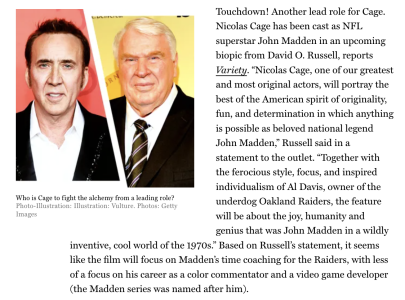
World of Reel‘s Jordan Ruimy has been told that a rumored New York Film Festival screening of Todd Phillips‘ Joker: Folie a Deux, allegedly slotted to screen in the festival’s Spotlight section, been “put on hold” due to the intensely negative industry reaction to Joaquin Phoenix‘s sudden abandonment of Todd Haynes‘ 1930s gay relationship drama. Phoenix freaked and walked just before shooting was about to begin in Mexico.
HE agrees it was very bad form — rash, traumatic, wildly unprofessional — for Phoenix to bail on the Haynes film, even though I felt personally relieved about not having to watch it down the road. There are tens of millions of fellows like myself who regarded the prospect of watching the 50ish Phoenix perform ultra-graphic gay sex scenes…I shudder at the mere thought. In this sense I am not the least bit sorry that the Haynes project is kaput. On the other hand I fully understand the rage Phoenix has incurred on a professional and political basis. A lot of people have suffered financially because of Phoenix’s apparent instability.
Phoenix will nonetheless be in Venice for the world premiere of Folie a Deux, and you know he’s going to be grilled big-time about the Haynes project at the post-screening press conference.
The questions will be tough for Phoenix to answer as there’s no way he can avoid looking like an unstable headcase. Sample question: Why did Phoenix bring a gay love story to Haynes and urge a no-holds-barred approach to the sex scenes only to get cold feet at the last moment? Does he not know his own artistic temperament? His own basic thoughts and convictions? Is he some kind of undisciplined mood shifter who has no center?
How Phoenix answers this and other related questions will determine the tone of press coverage henceforth and affect the general award-season conversation about Folie a Deux.
I’m very sorry this happened as my expectations for Phillips’ film couldn’t be higher. It’s a shame that the Haynes disaster is probably going to create a black-cloud effect.
Venice Film Festival honcho Alberto Barbera to Vanity Fair‘s Rebecca Ford on (a) Luca Guadagnino‘s Queer, (b) Todd Phillips‘ Joker: Folie a Deux and (c) the all-but-total diminishment, prestige and award-season-wise, of the Toronto Film Festival:
Barbera on Queer: “It’s not an easy film. It’s very bold.” HE translation: Gushings of gay sex. Daniel Craig goes down on Drew Starkey and vice versa, and early on he fucks a young Mexico City lad.
Barbera: “I don’t know if you are familiar with the book or not. It’s a short novel that was published only in 1985, right after the death of William Burroughs. It’s a very autobiographical novel when Burroughs was a drug addict and a gay man, and he was forced to leave Texas. He went to Mexico City, and he started to cruise in the bars and the restaurants trying to find company.
“The film is fantastic. I think it’s the best film by Luca Guadagnino so far, and the performance of Danny Craig is absolutely outstanding.” HE translation: I’ve seen a snippet or two from Queer and can tell you that Craig exudes a great deal of emotional vulnerability.
Barbera: “It’s not just I think it’s the performance of his life. He’s a great, great actor, and he takes some risks, of course, because it’s something that’s not in line with his previous films.” Imagine Sean Connery or Pierce Brosnan getting down in the same fashion.
Queer‘s running time, by the way, is down to 135 minutes.
Barbera on Joker: Folie a Deux: “If you expect just a second part of [2019’s Joker], exactly the same kind of narrative and situation and so on, you are wrong, because the theme is much darker. It is much more inventive from every point of view. It’s completely unexpected. I think it is very bold, and brave, and creative, and an incredibly original film.”
Barbera on the collapse of the Toronto Film Festival (yippee!): “In 2012, most of the American films preferred to go to Toronto instead of coming to Venice, because Venice, of course, is more expensive. Toronto, it’s a lot cheaper and easier for them. In most cases, that was the option for the big studios. So it was not easy to convince all of them to come back to Venice. There were no studios’ films in Venice in 2012.
“The following year, we opened the festival with Gravity. That won the Oscar, and that was the beginning of a change in the relationship with the studios. After that, every year we had one or more than one films that went to the Oscars, then won the Oscars — like Birdman, Spotlight, La La Land, Shape of Water, Joker. So of course now it’s easy to get a film, because the studios and the Americans understood that they can use the platform of Venice to launch the film internationally, and to start a campaign for the Oscars, with all the press that we have in Venice.
“There is almost no press in Toronto, apart from the trades. We have something like 3,000 media representatives from all over the world, so they can really make a proper promotion with the film, the marketing of the film, starting from Venice.”